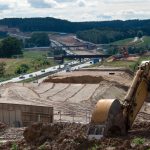PennEast Pipeline Blog
The controversial PennEast Pipeline project has generated fear and turmoil among the communities surrounding the proposed pipeline route. The natural gas pipeline is a project proposed by PennEast Pipeline Company, LLC, a partnership between 6 major energy companies: AGL Resources; NJR Pipeline Company, a subsidiary of New Jersey Resources; PSEG Power LLC; South Jersey Industries; Spectra Energy Partners; and UGI Energy Services (UGIES), a subsidiary of UGI Corporation. The pipeline is planned to move natural gas from Dallas, Luzerne County, in northeastern Pennsylvania to Pennington, Mercer County, in central New Jersey.
Residents in New Jersey and Pennsylvania are distraught by the impending project. The 108-mile pipeline route will cut through private property disturbing many homes and farms. Furthermore, the pipeline could damage an environmentally, culturally and historically significant area. Over 4,000 acres of preserved land will be impacted by the pipeline route.
Jacqueline Evans lives on an organic farm in Stockton, New Jersey and worries the PennEast Pipeline will destroy her farmland. The proposed pipeline is to be placed right outside her front door. She tells Yahoo! News that surveyors are trespassing on her property and harassing her family. Jacqueline fears the pipeline will diminish her property value and place her children in the “blast zone”.
Homeowners, farmers, businesses, and residents along the proposed PennEast pipeline route have joined forces to create HALT PennEast, an organization opposed to the project. Many believe the pipeline will negatively impact the environment. Residents fear pipeline construction will result in water contamination.
Tullis Onstott, a professor of geosciences at the Princeton University, is concerned that the pipeline could be particularly damaging to groundwater because of two underlying factors of the region’s geology: high levels of arsenic and uranium, and the low porosity of the rocks.
The Federal Energy Regulatory Commission (FERC), an agency that regulates the transmission of electricity and natural gas, has been reviewing the PennEast Pipeline project. FERC issued a final environmental impact report in early April that concluded environmental damage will occur. However, the issue could be mitigated if necessary precautions are taken.
The New Jersey Division of Rate Counsel (NJDRC), an independent consumer utility watchdog, conducted an analysis that found no need for the project. NJDRC reported that New Jersey currently receives more than 100 percent of the gas it requires from existing pipelines.
In addition, some of the controversy over PennEast stems from the partnership of companies that have proposed the project and the contracts those companies have to provide gas to themselves and their subsidiaries. Politico reports that PennEast has contracted approximately 74.2 percent of its output to its member companies and their affiliates. Because the companies that have come together to form PennEast are the same companies that are contracting to buy the majority of the gas, opponents argue that these companies can charge themselves to use the pipeline and then pass those charges onto consumers with rate increases and surcharges.
At this time, the PennEast Pipeline continues to move forward and is expected to receive final FERC approval late this summer. The pipeline is projected to be fully operational in the second half of 2018.
For more information, visit https://www.yahoo.com/news/new-jersey-need-penneast-pipeline-companies-want-build-thats-wrong-question-090039718.html
Every year, property owners across the country are impacted by a pipeline project via eminent domain. Pipelines cut through communities and private property, generating opposition and concern. Find out today if your property may be impacted by a pipeline project with an Impact Check Property Impact Report.
 Click here to order your Property Impact Report
Click here to order your Property Impact Report



